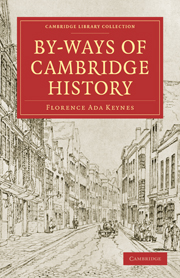Book contents
- Frontmatter
- PREFACE
- Contents
- ILLUSTRATIONS
- Introductory
- Chap. I The Guildhall and the Market Place
- Chap. II The Office of High Steward of the Borough of Cambridge
- Chap. III Cambridge Waits and Orlando Gibbons
- Chap. IV Barnwell Priory and the Old Abbey House
- Chap. V Why Oxford comes First. A Problem in Precedence
- Chap. VI Damaris Cudworth.—A Cambridge Woman of the Seventeenth Century
- Chap. VII A Town Plan for Cambridge in the Eighteenth Century
- Chap. VIII Mendicity House. Sidelights on Social Conditions in Cambridge in the Nineteenth Century
- Appendix: ‘Cambridge’ as a place-name
- Index
- Plate section
Chap. VIII - Mendicity House. Sidelights on Social Conditions in Cambridge in the Nineteenth Century
Published online by Cambridge University Press: 07 September 2010
- Frontmatter
- PREFACE
- Contents
- ILLUSTRATIONS
- Introductory
- Chap. I The Guildhall and the Market Place
- Chap. II The Office of High Steward of the Borough of Cambridge
- Chap. III Cambridge Waits and Orlando Gibbons
- Chap. IV Barnwell Priory and the Old Abbey House
- Chap. V Why Oxford comes First. A Problem in Precedence
- Chap. VI Damaris Cudworth.—A Cambridge Woman of the Seventeenth Century
- Chap. VII A Town Plan for Cambridge in the Eighteenth Century
- Chap. VIII Mendicity House. Sidelights on Social Conditions in Cambridge in the Nineteenth Century
- Appendix: ‘Cambridge’ as a place-name
- Index
- Plate section
Summary
MENDICITY HOUSE was an important feature of two successive social experiments undertaken in Cambridge in the nineteenth century, the earlier of which, the Anti-Mendicity Society, was the direct forerunner of the present Central Aid Society.
Following the Napoleonic Wars, widespread distress, due to lack of employment and the high price of food, resulted in the appearance of a drifting population in search of work or precarious maintenance by the charity of the public. The London Mendicity Society was founded in 1818 to deal with the problem. Cambridge, also suffering from an influx of these unfortunate persons, who, reduced to vagrancy and beggary, beset the Backs of the Colleges in particular, followed the example of London in 1819.
At a meeting of the Vice-Chancellor and other members of the University, and of the Magistrates and principal inhabitants of the Town of Cambridge, held on 8 May 1819, at Magdalene College, for the purpose of considering the propriety of establishing a Society for the Suppression of Mendicity, it was resolved unanimously:
1. That the Precincts of the University and the Town of Cambridge have long been much infested with Beggars and Vagrants.
2. That this class of persons, besides obtaining alms upon false pretences, are often guilty of extorting money by threats, of stealing in College rooms and dwelling-houses, and of committing various depredations in the vicinity of the Town, and that they not infrequently bring along with them fevers, small-pox, and other infectious diseases.
- Type
- Chapter
- Information
- By-Ways of Cambridge History , pp. 135 - 145Publisher: Cambridge University PressPrint publication year: 2009First published in: 1947



